
What’s fun, from your point of view?
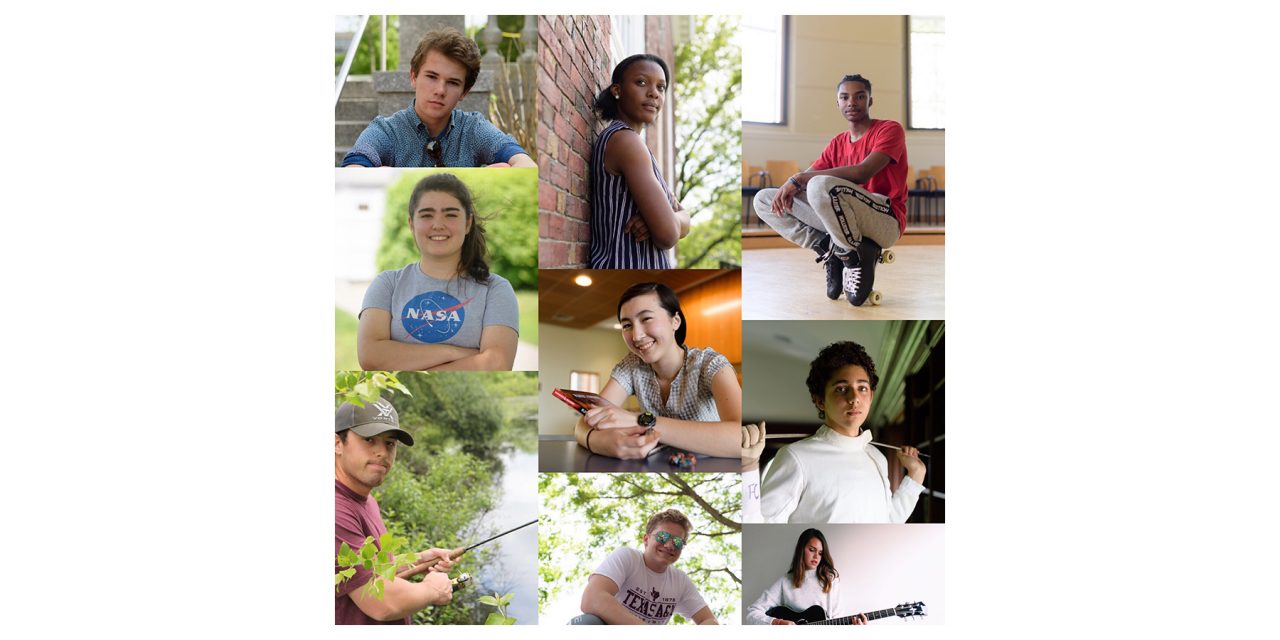
The vital role of play in the lives of successful, creative people has been documented in research for at least a century. Play affects social competency, resiliency, curiosity, and emotional control, among many attributes. Milton Magazine asked students what they really love to do, outside of class and school activities. They were quite clear about how having fun makes a difference in their young lives.
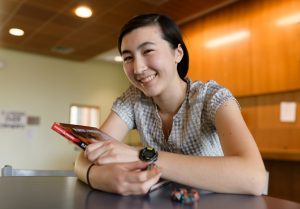 Daisy Marshall ’20
Daisy Marshall ’20
Create your character. Roll the dice. Laugh a lot.
Daisy can persuade you to try Dungeons and Dragons, even if that’s the last thing you’d ever do. A podcast called “The Adventure Zone” moved her, and many others, toward what Daisy calls “a more modern revival of the Dungeons and Dragons (D&D) game.” She’d heard that The Adventure Zone was a comedy, with elements of the high fantasy found in D&D, with good characterization across the board. “Because D&D was a game about using different classes, and especially different races, to play to the skills of your character. And it also had LGBTQ characters. I thought that was really interesting, and liked it because it’s such an open-ended game.”
Having only been in two “campaigns” herself (those are long D&D stories), Daisy found a host of interested, novice players at Milton and launched her own D&D campaign as the Dungeon Master. The Dungeon Master sets a barebones skeleton of a plot, Daisy says, and the objectives. “Your opening scenario has to allow lots of different possible interactions, or else you could be guilty of what’s known as ‘railroading your players.’” Players customize characters with class, race and alignment (a range from lawful to evil and chaotic). Then characters have statistics based on strength, dexterity and constitution (like resilience), along with intelligence, wisdom and charisma. Players determine their characters’ actions, and a roll of specialized dice determines the success of each action.
Daisy likes that improvisation is key to the game. “I’m trying to foster the players to be unafraid, to branch out, express themselves in ways they haven’t before. You can make a character exactly like yourself, or someone quite different. Whatever you create, you learn about how people interact with people, and you see how that interaction plays out.” Meeting in person gives the players a sense of connection that you don’t get in other ways, Daisy believes.
Daisy acted on stage when she was younger, and now she does theatre tech at Milton.
“I build the sets and do lights and other production-related things, because I realized that being on stage was a stressful thing for me. But I’ve been able to express the same kind of creative juices in a way, doing D&D.”
Daisy says she still has a ton to learn. She doesn’t know all the rules, for instance. But “to have a reason to get together with my friends, and tell a silly story and make stupid laughs — it’s really fun. This has been inspiring, in its own way, for me to reach out and try more stuff. It all started from this podcast, which connected me to the game, and the game connected me to the community — and doing this just helped strengthen our friend group, as well.”
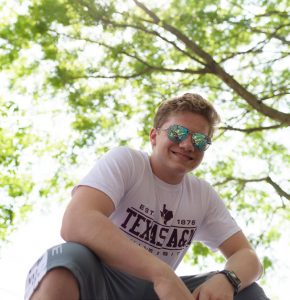 Marcus Falcone ’19
Marcus Falcone ’19
A Weather Center
Weather watching was an early addiction, admits Marcus. He was too young to understand the babble of the Weather Channel announcers, but just liked seeing the icons for snow amounts, the maps, and the graphics that showed what was happening. Try as she might, his mom couldn’t divert him toward Nickelodeon. “Many people want to be Superman,” Marcus says. “I just always wanted to be a meteorologist.”
He progressed from just watching snow speculation to focusing on the physics behind storms, monitoring their track and intensity, and everything associated with understanding them. He’s worked on landing an internship with the Blue Hill Observatory, and a corollary senior project. He’s attended weather camp during two summers at Penn State — and this year will “age up” to the summer weather program at Texas A&M.
The hands-on approach at Penn State was exactly what he wanted: the kids used the “giant forecast satellites, and launched and tracked weather balloons,” Marcus says. They toured the Accuweather headquarters, and used a green screen to broadcast their own forecasts. Marcus inadvertently wore a green shirt for his broadcast, so the memorable video of that morning features what looks like his head and hands “dancing on the screen.” Everyone at the program loves the weather, which was fun for Marcus. However, he sees himself as somewhat outside the standard expectation of a meteorologist: “You don’t necessarily think of someone who plays football.”
He’s a middle linebacker at Milton. In middle school, faculty caught on to his hobby and asked him to set up and manage his own weather board, which he did, offering his weekly sixth-grade forecast. “I spent a long time doing those little animations and pictures of snowflakes falling,” he says.
Snowstorms are his particular passion, which might change depending on where he relocates for college. For now, he likes digging in to the NOAA website, and the Midwest Computer Snow Output, where different types of snow computer models project disparate snowfalls and storm tracks. He admits to getting a little distracted from homework when a storm is mounting. “I have 15 kids texting me saying, ‘Are we going to have a snow day?’”
He’s intent on attending a university with a strong program in meteorology, and if it includes football, like Penn State, so much the better. Ultimately he’d love to be a broadcaster, or work at NOAA. “NOAA’s main mission is to protect lives and property,” Marcus says. “They track rivers, streams, flooding. Since they’re focused on safety, working there would give me a good feeling, knowing that I’d be doing some good.”
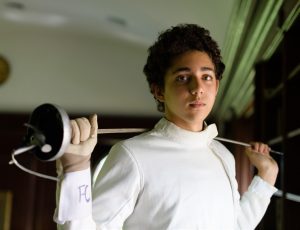 Zacary Omar ’21
Zacary Omar ’21
En Garde. Ready? Fence.
If Zacary’s dream were to come true, Milton would launch a fencing program. The Goodwin House resident started fencing when he was about 8 years old, following his three older siblings to The Fencers Club in Manhattan. He chose to compete in the sabre when he started, “because it had more to do with aggression and speed,” Zacary thought, but after trying épée, his siblings’ competitive choice, he fell in love with that.
At the club, one coach leads your classes, Zacary says, and then works one-on-one with you on basics or different types of hits. The same coach, goes with you to competitions, “to be right on the strip with you.” Zacary’s coach, who has also coached his siblings, will be with him throughout his fencing career. “It’s like he brought up all my siblings. He’ll point out something that’s unique about my fencing, that’s similar to my siblings, which is always fun to realize. He’s strict, and makes sure that you’re as close to perfection as possible.”
Épée particularly demands expertise in skill, pace and technique, Zacary explains. “We have target practice, because no matter how athletic you are, if you can’t beat their blade out of the way or nail your footwork, you’re not going to get anywhere.”
After a point or two, according to Zacary, you analyze what your opponent likes to do — attack or defend — and you change your game. If they’re very offensive, you might want to be offensive too, to show strength, so your opponent might back off. “Fencing is very much about strategy,” Zacary says, “changing your game to see what works well in the moment.”
This summer, Zacary began practicing right away, knowing he’d be rusty, to get ready for summer training camp in the Berkshires. “The camp’s goal is to get you in good shape for the season and then work on skill. Olympians come to talk to us, and I’ve actually fenced against the U.S. national team.”
Zacary has watched bouts turn very quickly: points and time may be against fencers, but they come back. “Whether it’s because they have support from their family or a coach, really, giving up is never an option.”
“When your opponent has a touch on you, it’s important not to let your confidence go down. If you do that, you won’t have the strength and speed and concentration that you would if you just moved on to the next point,” Zacary says, adding that he’s learned from fencers his own age, from coaches, opponents and his siblings.
Fencing as shared ground is part of his family relationship. “We’ll pretend to fence each other, walking around our home. They’ll see me doing something, and then they’ll parry it, or show me how to get around it, so it’s always really fun.”
When he started, Zacary thought he’d just follow his siblings along, but then as he made friends in his club, and continued to go to competitions and tournaments, “It just became something I was really into, something I would look forward to.”
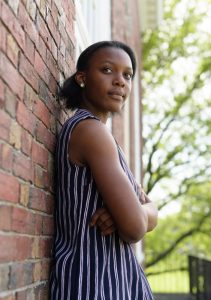 Olayeni Oladipo ’19
Olayeni Oladipo ’19
When the Music Moves You
Olayeni is the fourth of five Oladipo sisters, all of whom sing. Her parents infused the house with music, “and we believed from an early age that music is a powerful language,” says Olayeni. “We were forever singing around the house.” She and her sister Oladunni ’17 made their debut as the Oladipo Sisters with the Boston Pops at the 2011 Gospel Night, performing songs — written by their two older sisters — from their first album, “The Mighty One.” Together and separately they have performed at the Massachusetts State House, on NPR’s “Here and Now,” WHDH Channel 7 and WCVB Channel 5, and at numerous metro-Boston ceremonies and benefits.
Concentrating on Milton academics, sports and campus commitments slowed their production and performing schedule over the last few years, but during the months of her junior year, Olayeni and Dunni jointly wrote and recorded a new CD. Dunni was in England, on a gap year before college, and she would write and send Olayeni text messages with voice recordings. “I’d fix them up, add things, and send them back,” Olayeni says. “The album is called ‘The Rebirth,’ and that seems to be what was happening as we wrote back and forth — rebuilding this passion for gospel music. We, together, came up with nine new songs, and remixed one from the original gospel album.” In a week after January exams and another week in March, they recorded the album in Texas, working in the studio six hours a day.
With age, Olayeni says, she and Dunni were able to put ideas together in a song, and their older sisters could now shift to other roles, like marketing. Before the school year ended, they released a single from the album to Spotify and iTunes, and other outlets.
In “The Rebirth,” they intended to reference the roots of gospel, so they drew inspiration from songs they listened to when they were younger. Other songs introduce new styles and bring in some African beats they like. Olayeni thinks it’s “really cool” that this album mixes “all the cultures that we are, that we have, and that influence us.”
“For me,” Olayeni says, “singing gospel music is a form of praying, of worshiping God, which I believe is very important. It’s a way to be grateful, to be faithful. And to get rid of all the stress and baggage from other areas of my life. When you listen to the lyrics of our new CD in the car, you’ll feel things, and be one within yourself and with God. So that’s something I’m now able to grasp so easily.
“We want our music to reach people, to spread that message of peace, love and joy,” she continues. “We’re young people, sisters, singing gospel music. We want to share the message that you don’t have to give in to all the societal pressures of high school. You can do what’s important to you, and you don’t need to give that up.”
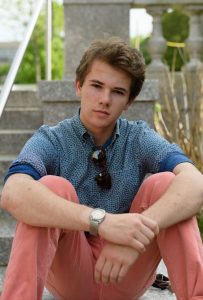 Pearce Crocker ’19
Pearce Crocker ’19
How You Tell Time
Pearce joins enthusiasts worldwide who are captivated by and insatiably curious about timepieces. He wears a favorite from his collection, an elegantly simple 1962 watch by
the Swiss watchmaker, Oris; he explains, “I’m interested in mechanical engineering, and that’s why I appreciate mechanical watches — spring-powered with a mechanical movement, not digital or battery-powered. Mechanical watches are examples of an art form that hasn’t changed for roughly 200 years, when many of the great Swiss watches were invented, and companies that make them still pride themselves on remarkable craftsmanship.” The movement varies, watch to watch, Pearce explains, but they’re all spring-powered, they have a counterbalance which is like the pendulum in a clock, on a much smaller scale. Often, mechanical watches have a display back made of glass so you can see the movement.
Pearce uses websites, blogs and YouTube to keep up with new designs and developments. Baselworld, an annual convention in Basel, Switzerland, showcases cutting-edge technology and design in the mechanical world. Newly developed calibers are super accurate — they don’t lose seconds, and have power reserves of roughly 90 hours before they need to be wound. Some have a chronograph (timer) and a perpetual calendar. A new watch by Patek Philippe will tell the time mechanically in any time zone.
Pearce loves a Bulova Accutron watch that belonged to his grandfather, Edgar Crocker ’49. His great-grandfather, also a fan of mechanical things, had a mechanical pedometer, custom-designed by Girard-Perregaux. Pearce’s first watch was a $30 Timex, and he’s intrigued by the colorful history of that company, including the fact that it supplied U. S. servicemen with military watches in World War II. Pearce researches the histories of the world’s legendary firms, like Omega, the official timekeeper of the Olympics since 1932. He owns a watch made by HTV, for instance: Hindustan Machine Technologies. “This was a company based in Delhi, India,” says Pearce, “when India was part of the British Empire, and was independently created by citizens of India separate from the British rule. These watches were widely used by British soldiers in the First and Second World Wars.”
“Watches are personal expressions of style,” he points out, in a segue to his correlating interest in men’s fashion, again with international awareness. He calls today’s U.S. street wear “an amalgamation of art-house design and high fashion, mixed with athletic wear. It’s kind of fascinating.” Most high-schoolers don’t want to draw attention to themselves, Pearce admits, but he finds developing his own style gives him a confidence and sense of identity. He shares those style ideas on his Instagram account, @prepclassique. “I like a more classic idea of men’s wear — not un-relaxed, not stiff, just classical and traditional. I really appreciate the way you can present your own style, and kind of have fun with it.”
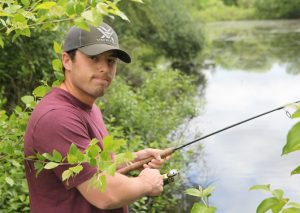 Ryan Cervoni ’19
Ryan Cervoni ’19
Landing Trophy Trout
Resting his boulder-sized backpack for a moment before heading to varsity baseball practice, Ryan beamed his excitement at the prospect of talking about his passion: fishing. It’s an inclination rooted in family; Ryan’s parents are native Floridians, and frequent saltwater fishing trips with his grandfather in the Sunshine State color his childhood.
But as a 13-year-old, the Wolcott House resident taught himself freshwater fishing. The occasion was a summer away from baseball after elbow surgery. “I looked at online videos and went to the tackle shops, got the right tackle, the right line, and rigged up my rods,” he says, and tested the scene at Walden Pond and White’s Pond, near his home. “I fell in love with it.”
Soon, he thought it would be cool to fish away from shore. His family helped him scout out a fishing kayak from a convention in New Hampshire. “You can stand in it,” Ryan says. “It has an adjustable seat, rod holders, compartments in the front and back to store my cooler and backpack, and a bag for the fish.”
The kayak drifted in Walden’s pond currents, so he and his dad improvised an anchor solution. Now everything’s perfect — Ryan brings three rods, casts two up with worms, and sets them in a rod holder. Then he might use a lure on one of his other rods, depending on the type of fish he’s after.
He’s familiarized himself with the differences among freshwater fish like smallmouth and largemouth bass, rainbow and brown trout. He seeks out the deepest ponds in nearby towns and paddles the kayak way out, sometimes starting at 3 a.m. on a summer morning — when it’s cool the trout are more likely to come closer to the surface. He prints out depth charts, and tries to locate himself on the pond. Of Ryan’s friends who like fishing, at least one is as devoted as he is. Others, he says, “do it as a fun activity. I do it as a lifestyle.” His hobby demands patience — plenty of patience. But along with the watchful waiting comes a break from stresses, and a chance to reflect on things in his life, Ryan says. “I just love being outdoors,” he adds, “the scenery, the smell, the water. I’m willing to wait for a fish. Catching one is rewarding.”
Ryan has lots of plans and goals for the coming year — not only experimenting with his new gear, like a depth finder on his kayak and a new Garmin fish finder, but also landing one of those trophy trout, as well as learning more about fly fishing and starting to use it. He’ll fish forever, he thinks. “It’s a skill you learn and keep learning. There are so many fish out there, so many species. “
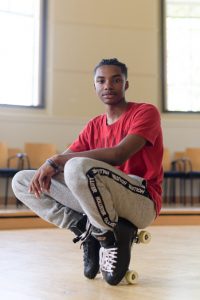 Nick Johnson ’21
Nick Johnson ’21
Wheels on Your Feet
During the summer, Nick roller skates everywhere: to his job at the community center, to visit friends, to his cousin’s, back home. Not only does he nearly float over flat surfaces, he flips, skates on his toes, spins, does cartwheels — with effortless grace.
When his dad started to skate more often, he bought Nick, then 4 years old, a pair of skates, and they went off to the tennis courts. Nick tied on those eight wheels about once a month, but around his sixth grade summer, he starting skating with his dad every weekend, and during the week as well. After wondering a bit whether it was weird to like skating, or just different, he decided to continue, “because this is what makes me, me,” Nick says.
His dad taught him, and then they’d travel to places where roller skating is big, like Baltimore. “I just followed along with other people that I saw, and I’d ask ‘Oh, how do you guys do that?’” Nick learned quickly, and got better, he says, but the main thing was how much fun it was. “The entire experience of skating was just relaxing. It was like dancing, but not, because you’re on wheels.”
Last fall he started doing many things he hadn’t been able to do, but he was surprised to learn what a big skill breakthrough he’d had during the summer. A rink-owner invited him to an adult-only skating event. “Why is this kid here?” the Forbes House resident imagined the skaters asking themselves as he met them. “Yeah, I’m pretty good at skating. I’m not great, but I’m good,” Nick told them. When he got on the skating floor and did a couple of simple things, everyone seemed to say, “Oh, that’s why he’s here. Because he’s really good,” Nick recalls. “After that, people would start skating with me,” Nick says. It turns out he was able to do things on his skates beyond what they had mastered. Nick thinks it was all that time at the rink — about eight hours most days, along with exposure to other skaters.
“Roller skating for me is an escape from everything. I don’t worry about homework, friends, social life, anything — just me and the people around me. It’s like my form of meditation, really relaxing.” The event was a “big meetup” for people passionate about skating. “You don’t have to know anyone, but people will come up and compliment your skating, then you skate together, making up a little rhythm that you follow through on the rink.” Nick is grateful for all the people he’s met who enjoy skating as much as he does.
His dad’s gifts of skates have become an annual event. Nick says he’s kept them all. They represent his different stages. “Each year, a different skate, a different me, but at the same time, the same me.”
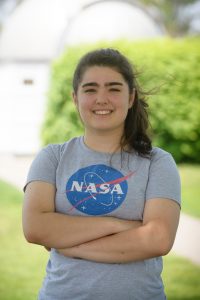 Avery Miller ’20
Avery Miller ’20
“There’s Just So Much to Explore”
“I’m the type of person who goes online looking for designs of super complicated rockets, and just looks at them and thinks, ‘I wish I could do that!’” says Avery. A Halloween photo of Avery in her astronaut’s uniform is a clue as to when her interest in space started. As a child, she would regularly rattle off NASA facts, which she assembled from the “never-ending supply of books” at her house. One of her favorite books was about space and spaghettification, or what happens when matter gets sucked into a black hole. Eventually she started connecting her reservoir of facts to what she was doing in school. At Milton, the engineering aspect of space piqued her interest. In Lower School, Mr. Shrager (science) “was into letting people build stuff, and just experiment.” She made some “crazy things” and decided “I’m not half bad at this.” The era of 3D robotics printing for kids had opened up, and she used the Maker Bot to create.
She attributes her willingness to head off to Mars to a certain optimism. “The Earth is great and I love it, but there’s so much to explore, and I’d love to explore a different planet and provide information that might provide solutions to problems, or ideas for cool inventions,” says Avery. She acknowledges how much has to be addressed before a Mars trip; still, “it’s a dream,” she says, “but an achievable one.” She’s not a fan of the privatization of the space industry, however, because it might limit access to information and experimentation. Research should serve the greater good, she believes.
Avery still loves to read, and is involved in robotics and rocketry outside of class, but faculty know how much she loves NASA and engineering in general. They help her find ways to tie it in with her courses; for her Class IV physics DYO (Design Your Own) experiment, she built rockets, for instance, and for math she gave a talk about projectile motion. Her end-of-year project had to do with parabola motion. For history, she’s done papers on the space race, and on women Air Force pilots in WWII.
Feminism is another focus for Avery, who’s well aware of the low numbers of women in the STEM fields. Already, she was the only girl and the youngest person in the mechanical engineering group of interns at a robotics firm in Florida last summer. Space, she says, has just brought together her wide-ranging interests.
A certain freedom comes with having an interest so deep, Avery acknowledges, but with it comes a kind of pressure. “Having something you know you want to do forever means that everyone is watching to make sure you’re doing that thing. It can be a bit suffocating. But I just love the unknown, which is why being constantly in search of answers is so tempting.”
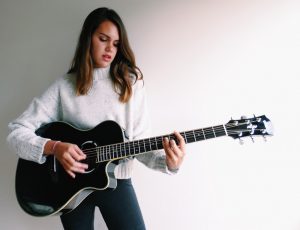 Eva Westphal ’18
Eva Westphal ’18
A Violinist Turned Vocalist
“I always sang around the house when I was little, but I was terrible,” laughs Eva. “I was really a horrendous singer. Even my parents thought so, but I loved it so much.” She played violin at an early age, but apparently some of her musical talent took a bit longer to shine. “I started musical theater around age 12,” Eva says. “I also started classical music training. I became more serious about it.”
Eva persuaded her parents to buy her a guitar and she taught herself to play; then she began to craft her own songs. At Milton, she was able to expand her singing and develop her voice. Freshman year, she sang at Beatnik, the student open mic night. “I sang an original song, but I was so embarrassed I didn’t tell anyone it was an original. But the experience gave me the confidence to do more,” Eva says.
Balancing demanding academics and dreams of a singing career, which Eva describes as “two very different competitive worlds,” she continued to work hard on her own music, jumping at chances to perform. She stopped musical theater, but continued classical singing at the New England Conservatory. She sang “God Bless America” at a Red Sox game and performed at Outside the Box, a Boston music festival. She’s performed in prestigious spaces such as at Jordan Hall and Carnegie Hall as well as
live on local radio stations.
At Milton, she continued to play the violin in both the orchestra and chamber orchestra. During the chamber singers and orchestra trip to Italy during spring break this year, Eva played violin but also sang a solo during each performance. “I am so grateful for Milton because I don’t know many other places that would have allowed me to go on tour as an orchestra member but also sing as a soloist.”
“My voice has changed a lot,” Eva says. “I’ve cycled through different phases. At first, when I was singing acoustic, I didn’t have as much control as I do now. It’s interesting to hear what I sounded like four years ago because there was a lot of uncontrolled belting. During sophomore year, I started writing jazzier songs. I still like a lot of those songs, and one of them is going to be on my album.”
Eva’s album is a five-song project she’s developed with well-known producer Richard Spillberg. Sitting solo in a dark booth singing into a mic for hours at a time might sound lonely, but Eva says she loves the work. Today her music leans more toward pop; her songs tell stories from her life, her peers, her generation. She performed these songs at her senior project performance.
Before she begins at Columbia, Eva is taking a gap year to travel and to pursue some music opportunities. She is realistic. “I’d love to have some sort of solo career, but I don’t see that for the long term. There are very few people who succeed at a solo career and for most, it’s pretty short term and fleeting.” But she does see herself in the music business, whether as a songwriter or on the business side of the industry.




